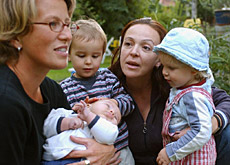Cabinet holds back paternity leave plan

The Swiss government has stymied plans by Economics Minister Doris Leuthard to introduce five days' paid paternity leave in her department with immediate effect.
In a statement on Wednesday the cabinet said it wanted to have the same rule for all ministries – currently only two days is allowed – putting its colleague’s plans on ice.
As part of her agenda for 2007, Leuthard, who took up her post in July, announced on Monday that a raft of family-friendly measures would be introduced immediately within the economics ministry.
This included new fathers being able to take five days’ paid and 20 days’ unpaid paternity leave.
“My department hopes to set an example to the economy as a whole,” Leuthard said at the time.
According to cabinet spokesman Oswald Sigg, the government was not against Leuthard’s idea as such, but wanted to ensure that all the ministries benefited from the same rule. For now the economic minister’s plans have been suspended.
Sigg said that government employee regulations stated that new fathers were only allowed two days paternity leave. It was not possible to grant certain ministries an exemption.
However, Sigg was anxious to play down the cabinet’s decision, saying that Leuthard’s department had consulted the Federal Personnel Office over her plan and that the office had probably interpreted the current rules too generously.
He added that the government was due to discuss the paternity leave issue as part of the revision of the civil servants law this summer.
Leuthard declined to comment on the cabinet statement, but her spokeswoman said that the minister hoped that a future decision would take into account her wishes.
Gaining ground
The concept of paternity leave has been slowly gaining ground in Switzerland, coming after women were finally granted the right to 14 weeks’ paid maternity leave from July 2005.
There is currently no such legislation for Swiss fathers who must depend on their employers’ generosity and understanding. Political support for a law has generally not been strong.
On average, companies allow new fathers between one and three days’ paid leave to help care for their babies, but a growing number is now going further.
The main food retailer Migros recently announced that as from January 1 its male employees would be allowed to take two weeks’ paid and two weeks’ unpaid leave, while the Swiss Federal Railways declared its staff could take five days’ paid leave.
The Alternative Bank and Mobility CarSharing are two of the most generous employers in this respect, granting one month paid paternity leave, followed by IBM Switzerland and Schauspielhaus Zurich, which provide three weeks’ paid leave.
But this is still a far cry from the situation found in most Scandinavian countries.
Denmark currently grants 28 weeks’ paid maternity leave, of which the father can take ten weeks, while new Finnish parents are entitled to one year’s paid leave, with the mother taking the first 21 weeks and the remainder being shared between both parents.
swissinfo with agencies
Maternity benefit was anchored in the Swiss constitution in 1945. But voters rejected compulsory paid maternity leave on four occasions – in 1974, 1984, 1987 and 1999. It finally passed at the ballot box in September 2004 with a 55.4% majority.
As of July 1, 2005, all women working in Switzerland qualify for a minimum of 14 weeks’ maternity leave, at 80 per cent of their normal salary.
Paternity leave is not governed by Swiss legislation and is left to the discretion of the father’s employer. On average, Swiss companies grant new fathers between one and three days’ paid leave.
The Leuthard’s new family-friendly policies would include more part-time posts for men and women, more flexible working hours, job-sharing, the payment of up to 50 per cent of childcare costs, five days’ paid and 20 days’ unpaid paternity leave and working from home.
The cabinet also took Leuthard to task over comments she made on a television programme over tax breaks made to rich foreign residents. She said these were discriminatory towards wealthy Swiss taxpayers.
The government said that it stuck to its position over tax breaks for foreigners. Even Leuthard’s own ministry tried to play the comments down, saying they were personal views.

In compliance with the JTI standards
More: SWI swissinfo.ch certified by the Journalism Trust Initiative











You can find an overview of ongoing debates with our journalists here . Please join us!
If you want to start a conversation about a topic raised in this article or want to report factual errors, email us at english@swissinfo.ch.